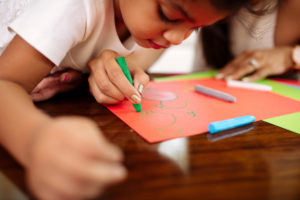Recently, Center for Healthy Minds faculty Sarah Short and Julie Poehlmann-Tynan shared their expertise for the virtual event The World We Make 2020, discussing the importance of nurturing the development of healthy minds in our children. In this article, we share insights from that discussion.
Studies have shown that during the COVID-19 pandemic, both children and parents are experiencing more mental health symptoms and more stress than they had before. The issue of poverty is growing now as a result of the pandemic. There is an expected rise in homelessness and food insecurity. According to Child Trends, as many as 20 percent of the population in the United States is living at or below the federal poverty threshold. And an even larger percent – 40 percent are children impacted by poverty. This is equivalent to 26 million children. The impact is highest among Black and Hispanic children - who are twice as likely as white children to live in poverty.
Poverty is a systemic issue that touches every corner of our country and has far-reaching consequences for the health and well-being of our population. Children who are growing up in poverty have an increased risk for behavioral, social and emotional health challenges. In addition to poverty, more than 5 million children have a parent who is incarcerated. These children are faced with unique stressors that must be addressed to support their well-being.







